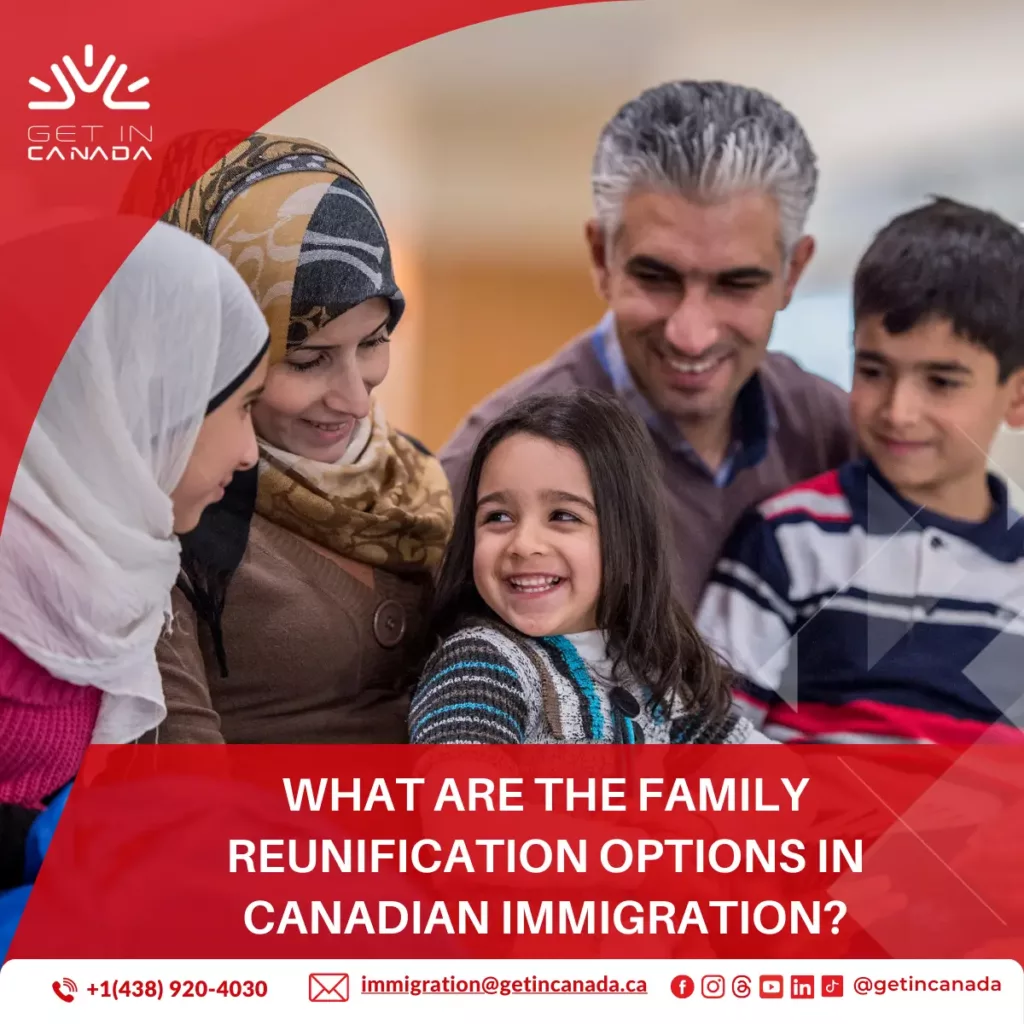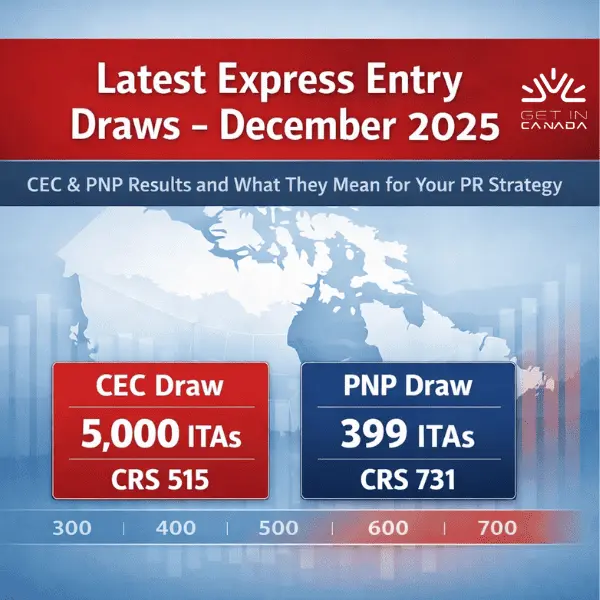What are the family reunification options in Canadian immigration?
Immigrating to Canada comes with the aspiration of reuniting with family members already established in the country. In this blog, we will delve into the various pathways and requirements for family reunification in Canada. From spousal sponsorship to parental sponsorship and beyond, we will uncover eligibility criteria, and the application process, whether you are a Canadian citizen looking to sponsor your spouse or a permanent resident seeking to bring your parents or children to join you in Canada, this guide aims to shed light on family reunification options in Canadian immigration.

Sponsorship eligibility criteria for family members
Some conditions must be met by the sponsor, which are:
- Age: The sponsor must be a minimum of 18 years old.
- Residency Status: He or she must be a permanent resident or Canadian citizen.
- Financial Capability: The sponsor must demonstrate the ability to provide financial support to the relative while they are in Canada.
- Residence Location: The sponsor must be residing in Canada or intending to reside in Canada when their family member becomes a permanent resident, with a few exceptions.
Who are the eligible sponsored individuals?
The family members that you can sponsor can be represented by the following:
- Spouse/Common Law Partner
- Dependent Children
- Parents and grandparents
Find out if you are eligible to get in Canada →
Let’s delve into the individuals you can sponsor, accompanied by additional details
Spouse/Common Law Partner:
Sponsorship Eligibility for Canadian Citizens and Permanent Residents:
- Spousal Sponsorship: If you are legally married.
- Common-law Partner Sponsorship: If you have lived together for at least 12 months in a conjugal relationship but are not legally married.
- Conjugal Partner Sponsorship: If you are not legally married or in a common-law relationship and your partner lives outside Canada.
The sponsored person must be at least 18 years of age and not closely related to the sponsor.
Types of Spousal or Common-Law Sponsorship Applications:
Inland Sponsorship:
- Application made from within Canada when the sponsored person is currently in Canada.
- Allows applicants to reside in Canada while processing their permanent residence application.
- Sponsored persons may apply for an open work permit to work for any employer in Canada during the processing.
Outland Sponsorship:
- Application made from abroad through an Embassy or Consulate.
- A sponsored person usually waits for permanent residence outside the country but may visit Canada.
Dependent Children:
Definition of Dependent Child:
- A child is considered dependent if unmarried, not in a common-law relationship, and under 22 years of age.
- If you are over 22, you may still be considered dependent if you have a physical or mental condition preventing self-support.
Program Requirements:
- Both sponsors and children abroad must be approved by Immigration, Refugees, and Citizenship Canada (IRCC) for visa issuance.
- Must provide evidence of a relationship with the sponsored child through a birth or adoption certificate.
Parents and grandparents:
Program Overview
- Parent and Grandparent Sponsorship Program (PGP): Provides Canadian citizens and permanent residents with the opportunity to sponsor their parents and grandparents for immigration to Canada.
- Super Visa Program: Offers an alternative for Canadian citizens and permanent residents to bring their parents and grandparents to Canada as temporary residents with extended stays.
Income-Requirement Assistance: A spouse or common-law partner can assist in meeting the income requirement by co-signing the undertaking.
Eligibility Criteria for Co-signer (The co-signer signs the sponsorship agreement along with the sponsor and helps fulfill the financial obligations associated with sponsoring the parents or grandparents to come to Canada):
Co-signer Requirements:
- Same eligibility criteria as the sponsor.
- Exclusion: You cannot be the person being sponsored.
- Relationship: Must have cohabited with the sponsor in a conjugal relationship for at least one year.
Introduction to the Parent and Grandparent Super Visa
The Parent and Grandparent Super Visa is a special multi-entry visa designed for eligible parents and grandparents wishing to visit their family members in Canada.
Validity Period
This visa is valid for a duration of up to ten years, allowing frequent visits to Canada without the need for frequent visa renewals.
Stay Duration
Holders of the Super Visa are permitted to stay in Canada for up to two years at a time during each visit, providing extended periods with family members.
Comparison with a regular multiple-entry visa
Unlike a standard multiple entry visa, which typically allows stays of up to six consecutive months per entry, the Super Visa offers the advantage of continuous stays for up to two years without leaving the country.
Extension Process
While holders of a regular multiple-entry visa must apply for extensions and pay additional fees to stay longer in Canada, the Super Visa eliminates this requirement by allowing continuous stays for extended periods.
Convenience and flexibility
The Parent and Grandparent Super Visa offers convenience and flexibility for eligible individuals seeking longer visits with their family members in Canada, enhancing their overall travel experience.
Eligibility for a Parent or Grandparent Super Visa
Here are the eligibility criteria for the Parent or Grandparent Super Visa:
- Relationship Requirement: Applicants must be the parent or grandparent of a Canadian citizen or permanent resident residing in Canada.
- Admissibility Criteria: Applicants must meet the general admissibility requirements to enter Canada, ensuring they are not deemed inadmissible for any reason.
- Additional Visa Requirements: Applicants must fulfill any other specific requirements outlined for the parent or grandparent super visa, as specified by Immigration, Refugees, and Citizenship Canada (IRCC).
Requirements for the Parent and Grandparent Super Visa
In the following, we’ll discuss the requirements for the visa:
- Financial Support Letter: Applicants must obtain a letter from their child or grandchild in Canada confirming their commitment to provide financial support during the visit. Additionally, documents demonstrating the sponsor’s financial capability under the program are required.
- Medical Insurance Coverage: Proof of Canadian medical insurance coverage for a minimum period of one year is mandatory for visa applicants.
- Immigration Medical Exam: Completion of an immigration medical examination is necessary to meet the health requirements for the super visa application.
- Demonstration of Intent to Depart: Visa applicants must convince the visa officer of their intention to leave Canada upon the expiration of their authorized stay. This involves demonstrating ties with their home country and ensuring a commitment to return at the end of the visit.
Steps for Applying for Family Sponsorship
Application steps can be presented in five steps, which are:
Step 1: Assess Sponsor Eligibility
Before initiating the sponsorship process, ensure that you meet the eligibility criteria to become a sponsor.
Step 2: Verify Relative Eligibility
Confirm that the relatives you intend to sponsor meet the necessary eligibility criteria.
Step 3: Submit Applications
Submit your sponsorship application at the federal level to the Ministry of Immigration, Refugees, and Citizenship Canada (IRCC). If you are a Quebec resident, submit your application at the provincial level to the Ministry of Immigration, Francization, and Integration (MIFI). Combine your sponsorship application with the permanent residence (PR) status applications of your family members or relatives. Upon sponsor eligibility approval, your PR application will undergo review.
Step 4: Pay the application fee
As part of the process, you will need to pay the family sponsorship application fee.
Step 5: Dispatch Application
Send your application to the appropriate address as outlined in the sponsorship guide available for download on the government website.
In conclusion, whether you are sponsoring a spouse, partner, parent, grandparent, or dependent child, understand the eligibility criteria and application process. By exploring the pathways outlined in this blog, individuals and families can make informed decisions and take proactive steps toward reuniting with their loved ones in Canada. As Canada continues to prioritize family reunification in its immigration policies, it is crucial to stay informed and seek professional guidance when navigating the intricacies of the immigration process. Ultimately, the goal of family reunification is to create a supportive and nurturing environment where loved ones can thrive together in their new Canadian home.











